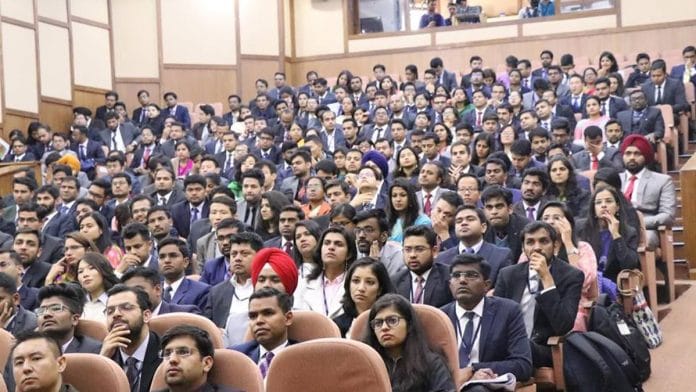New Delhi: The Centre and West Bengal are currently locked in another row, this time over the deputation of three IPS officers. But ThePrint has learnt that Bengal has one of the lowest numbers of IAS and IPS officers posted at the Centre, as the state government has routinely denied officers no-objection certificates that are required for their deputation.
The Union Ministry of Home Affairs (MHA) Saturday unilaterally summoned three IPS officers from West Bengal — who were in-charge of BJP national president J.P. Nadda’s security when his convoy was attacked last week — for central deputation. A day later, the Mamata Banerjee government said it “cannot spare” these officers.
According to the All India Service Rules, every state is supposed to send a minimum number of IAS and IPS officers — roughly 25 per cent of its cadre strength — for central deputation. This number is known as a state’s Central Deputation Reserve (CDR).
For Bengal, the CDR for IAS officers is 78, but according to Department of Personnel and Training data accessed by ThePrint, the state currently has just eight IAS officers deputed to the Centre. In all, the state has 307 IAS officers.
Other states with big cadres, like UP, Karnataka, Madhya Pradesh and Bihar, have sent 44, 20, 27 and 36 IAS officers respectively to the Centre.
On the IPS front, Bengal has relieved only 12 out of 281 IPS officers for central deputation. Based on the 25 per cent minimum requirement, Bengal should be sending at least 86 IPS officers to the Centre. The state’s total IPS officer strength is 347, which is the highest in the country.
Also read: Home ministry cites ‘acute shortage’ of IAS, IPS in J&K and Ladakh, seeks urgent deployment
‘Drawback’ of Bengal cadre
“This is a routine complaint made by officers in West Bengal — that we are not sent for central deputation. Officers send their names, but they are not cleared by the state government on account of shortage or something else,” said a Bengal-cadre IPS officer who requested anonymity.
“This case is different because there is politics involved, but even routine postings are denied to the Centre by the West Bengal government. This is a big drawback of this cadre because postings to the Centre are a major attraction for any officer. Besides, it is also not in the spirit of the all-India character of the IAS and IPS,” the officer said.
However, a senior Bengal cadre IAS officer said it is the prerogative of the state to decline to send officers to the Centre, especially considering the shortage of officers at the state level.
“In West Bengal, the cadre strength of the IAS is 379, and it has a total of 307 officers right now, so it is obviously the state government’s prerogative to send or not send officers,” the IAS officer said.
“The Centre, which has a massive shortage itself, has been toying with the idea of making central deputation compulsory, but it cannot do so because deputation is the right of state governments by and large,” he added.
‘Could set a precedent’
While the All India Service Rules state that in case of any disagreement between the Centre and the state over matters of deputation, the matter shall be decided by the central government, it seldom happens that the Centre asks for certain officers by name, according to former DoPT secretary Satyanand Mishra.
“It is very rare for the Centre to say I want this particular officer to come to the Centre. What if the officer does not come? The rules say that the Centre has the final say, but it doesn’t specify what happens if the state still refuses to relieve a certain officer,” Mishra said.
“So, in that sense, what happens in this case could set a precedent of sorts because the Centre cannot take any action against the officers who are working under a state government. At most, we only nudge the states to send more officers for central deputation, but as long as an officer is under the state government, the Centre cannot take any action against them,” he reiterated.
A DoPT official told ThePrint on the condition of anonymity that the matter is being discussed at the “highest level”, and the government could potentially explore the legal route.
“The central government has the grounds to take the matter to the Supreme Court, or it could simply debar these three officers from coming to the Centre for five years or more,” the official added.
Also read: Govt wants IAS, IPS officers to be nice to public, organises training to make them ‘friendly’






